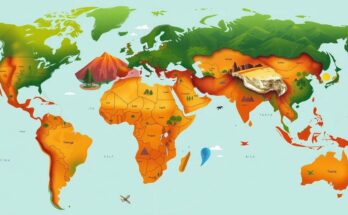The paramilitary RSF has seized control of gum production areas in Sudan, leading to illegal exports of gum arabic without proper certification. Meanwhile, neighboring countries are undercutting market prices for this commodity, raising concerns about ethical sourcing. Major industry players must adapt sourcing strategies to navigate the challenges posed by the ongoing conflict. The role of smuggled goods in global supply chains presents a critical issue for ensuring compliance with sustainability standards.
In recent months, the control of vital gum-harvesting regions in Sudan has shifted to the paramilitary Rapid Support Forces (RSF), which are engaged in conflict with the national army. The RSF demands fees for the marketing of gum arabic, severely impacting the trade landscape as producers and buyers navigate a market dominated by illegitimate transactions. Informal border markets are now facilitating the export of gum arabic without proper certification, raising concerns regarding the origins and legality of the product.
Traders in neighboring countries, including Chad, Senegal, and Egypt, have begun offering gum arabic at lower prices, often without the necessary conflict-free certification. As Sudan remains the primary source of gum production in the “gum belt”, various actors within the country are exploiting the situation for financial gain despite the ongoing civil unrest. The complexities of this trade continue to grow as the RSF engages with global commodity markets without adequate oversight.
Herve Canevet of Eco-Agri stresses that tracing the source of gum arabic has become exceptionally challenging, asserting that nearly all gum from Sudan is acquired through smuggled channels due to the lack of authoritative control in the region. The rise of corrupt trading practices poses significant risks to international supply chains for major ingredient manufacturers who rely on this commodity.
Comments from the RSF deny any wrongdoing, claiming they protect the gum trade while merely collecting minor fees. Despite industry groups asserting a lack of evidence linking the gum trade to military factions, insiders indicate that the opaque supply chains could jeopardize the integrity of major buyers, such as Ingredion and L’Oreal.
Market dynamics changed drastically as traders like Mohammed Hussein Sorge reported receiving offers for significantly undervalued gum arabic from Senegal and Chad. This low pricing, coupled with the absence of sustainable sourcing documentation, raises red flags about the legality of these products and their potential ties to RSF-affiliated smuggling rings.
New export routes have emerged, with gum being funneled to South Sudan and further transported to international markets, invoking serious ethical considerations about consumer goods produced from such dubious origins. Reports reveal gum arabic reaching distant markets either through established trading routes or online sales, with alarming implications for product legitimacy.
The RSF has expanded its influence by preying on local producers, imposing fees for alleged protection of their goods, often re-routing trade flows towards neighboring countries. The Sudanese political crisis complicates raw gum supply, as foreign demand for sustainability contrasts starkly with the chaotic circumstances within Sudan. Stakeholders in the global supply chain must now navigate this treacherous landscape to avoid inadvertently supporting conflict-driven trade practices.
The situation regarding the gum arabic trade in Sudan reveals the troubling interplay between conflict and commerce. The RSF’s control over production areas has generated a smuggling network that undermines the integrity of global supply chains. Industry players must remain vigilant and re-evaluate their sourcing practices to ensure compliance with ethical standards, as traditional routes for gum arabic are increasingly compromised by civil unrest and lack of oversight. Efforts to restore legitimacy and sustainability to the gum market are crucial, as the current circumstances pose a significant risk for both producers and consumers on a global scale.
Original Source: m.economictimes.com




